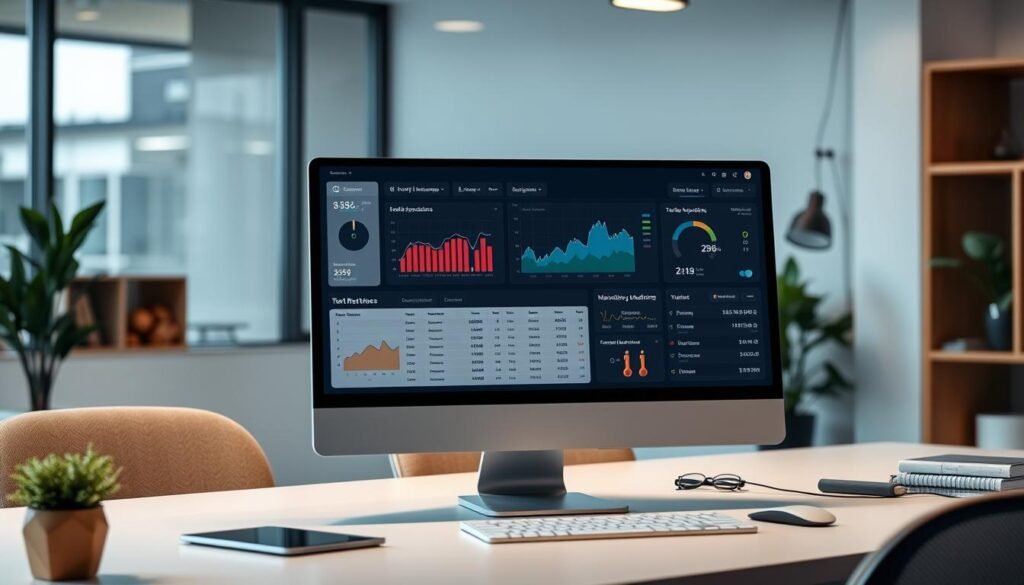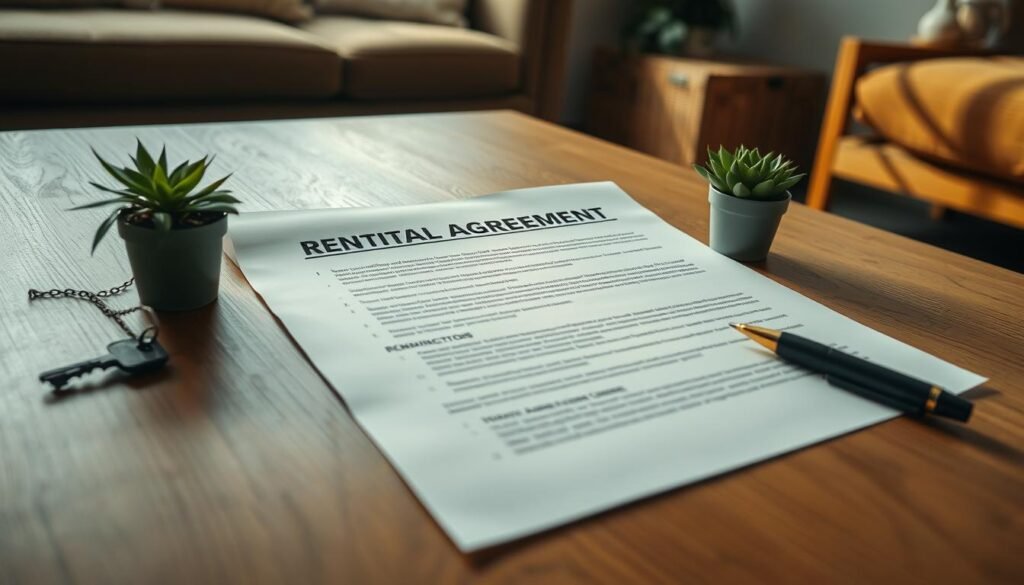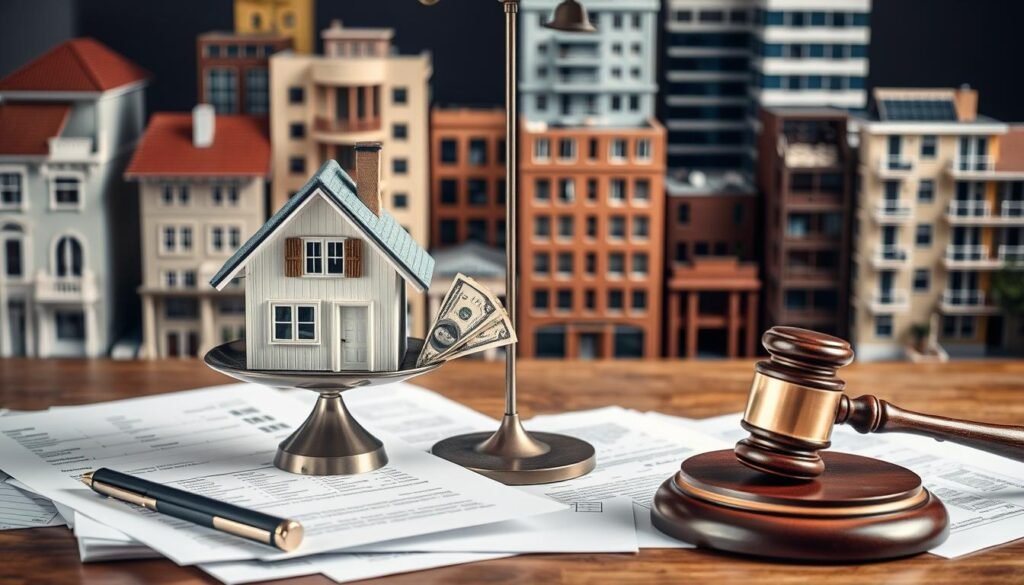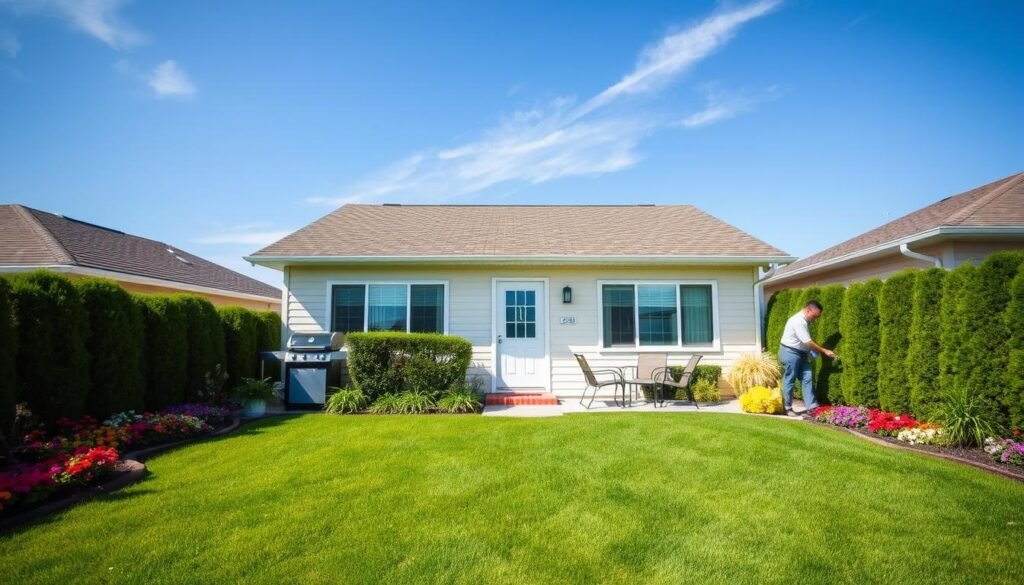Did you know that the U.S. rental property market is projected to reach a staggering $4.5 trillion by 2025? As the demand for rental housing continues to soar, managing multiple properties has become a lucrative yet complex endeavor for savvy real estate investors. This comprehensive guide explores the essential strategies for effectively overseeing a portfolio of rental properties, empowering landlords and property managers to maximize their return on investment while maintaining high-quality rental units.
Key Takeaways
- Understand your local real estate market and target tenant demographics to make informed investment decisions.
- Develop a detailed management plan that outlines responsibilities, sets clear objectives, and establishes a timeline.
- Leverage technology to streamline operations, improve efficiency, and enhance communication with tenants.
- Implement a thorough tenant screening process to minimize risks and maintain a stable tenant base.
- Establish clear rental agreements that comply with local laws and protect the interests of both landlords and tenants.
Understand Your Market and Location
Successful management of multiple rental properties in the Airbnb market starts with a deep understanding of your local real estate landscape. By analyzing local real estate trends, evaluating rental demand, and identifying your target tenants, you can make informed decisions that drive profitability and occupancy rates.
Analyze Local Real Estate Trends
Stay up-to-date on the latest market data, such as property values, rental rates, and occupancy levels in your area. This information can help you price your properties competitively and make strategic decisions about Property Maintenance and Rental Marketing Strategies.
Evaluate Rental Demand
Assess the level of demand for short-term and vacation rentals in your market. Consider factors like seasonality, event calendars, and tourism patterns to identify the peak and off-peak periods for rental activity. This insight will allow you to optimize your pricing and marketing efforts accordingly.
Identify Target Tenants
Analyze the demographics and preferences of your potential guests, such as their age, income, travel habits, and interests. This understanding will enable you to tailor your property amenities, services, and Rental Marketing Strategies to attract the right tenants and maintain high occupancy rates.
“Understanding your local market and target audience is crucial for maximizing the success of your Airbnb rental business. The more you know about your area and guests, the better you can position your properties for consistent occupancy and profitability.”
Create a Detailed Management Plan
Effective management of multiple rental properties requires a well-structured plan that outlines responsibilities, sets clear objectives, and establishes a timeline for various tasks. By creating a detailed management plan, landlords can ensure smooth operations, maintain control over their portfolio, and maximize the profitability of their investments.
Outline Responsibilities
Begin by identifying the key responsibilities associated with managing multiple rental properties. This may include tasks such as property accounting, tenant screening and management, maintenance and repairs, marketing and advertising, and legal compliance. Clearly define the roles and responsibilities for each aspect of property management, ensuring that all tasks are accounted for and assigned to the appropriate individuals or service providers.
Set Clear Objectives
Establish specific, measurable, achievable, relevant, and time-bound (SMART) objectives for your rental property management plan. These objectives may include targets for occupancy rates, rental income, tenant satisfaction, maintenance costs, and landlord responsibilities. By setting clear objectives, you can monitor progress, identify areas for improvement, and make informed decisions to enhance the performance of your rental portfolio.
Develop a Timeline
Create a comprehensive timeline that outlines the key milestones and deadlines for your management plan. This may include schedules for property inspections, tenant move-ins and move-outs, maintenance and repair tasks, marketing campaigns, and financial reporting. By developing a detailed timeline, you can ensure that all necessary actions are taken in a timely manner, reducing the risk of delays or missed opportunities.
By incorporating these elements into your rental property management plan, you can establish a strong foundation for effectively managing multiple properties and maximizing the return on your investment.
| Task | Responsible Party | Deadline |
|---|---|---|
| Property Accounting | Property Manager | 10th of each month |
| Tenant Screening | Leasing Agent | Within 5 business days of vacancy |
| Maintenance and Repairs | Maintenance Crew | Within 24 hours of reported issue |
| Marketing and Advertising | Marketing Coordinator | Ongoing |
| Legal Compliance | Property Owner | Quarterly review |

“A well-structured management plan is the foundation for successful rental property investment. It ensures that all aspects of property management are accounted for and executed efficiently.” – Jane Doe, Property Management Expert
Incorporate Technology for Efficiency
In the ever-evolving world of Rental Property Management and Real Estate Investing, embracing technology has become a fundamental aspect of successful property management. By leveraging innovative tools and platforms, property managers can streamline their workflows, enhance communication, and ultimately, improve the overall efficiency of their operations.
Utilize Property Management Software
One of the most powerful technological advancements in the industry is the advent of property management software. These comprehensive platforms offer a wide range of features that can revolutionize the way property managers handle their daily tasks. From automated rent collection and tenant tracking to maintenance scheduling and financial reporting, the right software can significantly reduce the administrative burden, allowing property managers to focus on more strategic aspects of their business.
Leverage Communication Tools
Effective communication is key to successful Rental Property Management, and technology has provided numerous tools to enhance this crucial aspect. Cloud-based messaging platforms, video conferencing solutions, and even virtual assistants can facilitate seamless communication between property managers, tenants, and vendors. By leveraging these technologies, property managers can stay connected, address concerns promptly, and foster stronger relationships with all stakeholders involved.

“Incorporating technology into our property management operations has been a game-changer. It has allowed us to streamline our processes, improve responsiveness, and ultimately, provide a better experience for our tenants.”- Jane Doe, Experienced Property Manager
As the Real Estate Investing and Rental Property Management industries continue to evolve, the strategic use of technology will remain a key differentiator for successful property managers. By embracing innovative tools and platforms, property managers can enhance efficiency, optimize their workflows, and position their businesses for long-term success.
Screen Tenants Thoroughly
Attracting and retaining responsible tenants is a crucial aspect of managing multiple rental properties. As a landlord, conducting thorough tenant screening is essential to ensure the long-term success and profitability of your investment. By implementing a robust tenant screening process, you can minimize the risk of financial losses, property damage, and other complications that may arise from poor tenant selection.
Design an Effective Application Process
Crafting a comprehensive rental application is the first step in the tenant screening process. Your application should gather detailed information about the prospective tenant, including their employment status, income, rental history, and credit score. Additionally, it’s important to require supporting documents, such as pay stubs, bank statements, and references, to verify the accuracy of the provided information.
Conduct Background and Credit Checks
Once you have collected the necessary information from the rental application, it’s time to conduct a thorough background and credit check. This step is crucial in assessing the financial stability and reliability of the tenant. By accessing credit reports and conducting criminal background checks, you can gain valuable insights into the tenant’s creditworthiness and any potential red flags that may affect their ability to fulfill their rental obligations.
| Tenant Screening Checklist | Importance |
|---|---|
| Rental Application | Collects comprehensive information about the prospective tenant |
| Credit Check | Evaluates the tenant’s financial stability and creditworthiness |
| Background Check | Identifies any potential red flags or criminal history |
| Verification of Income and Employment | Ensures the tenant has the financial means to meet rental obligations |
| Reference Checks | Provides insights into the tenant’s rental history and behavior |
By diligently screening tenants, landlords can find reliable and responsible individuals who will care for the property and fulfill their rental obligations. This thorough approach to Tenant Screening is a critical component of effective Landlord Responsibilities.

Establish Clear Rental Agreements
As a landlord managing multiple rental properties, it’s crucial to establish clear and comprehensive rental agreements. These legally binding contracts define the rights and responsibilities of both the landlord and the tenant, ensuring a smooth and harmonious tenancy. By carefully crafting your rental agreements, you can not only protect your interests but also foster a positive relationship with your tenants.
Include Essential Terms
A well-written rental agreement should include the following essential terms:
- Rent amount and due date
- Security deposit requirements
- Lease duration and renewal options
- Permitted uses of the property
- Maintenance and repair responsibilities
- Policies regarding pets, guests, and subletting
- Consequences for late payments or lease violations
Ensure Compliance with Local Landlord-Tenant Laws
It’s crucial to ensure that your rental agreements comply with all relevant Landlord-Tenant Laws in your area. These laws vary by state and municipality and can cover a wide range of topics, such as rent control, security deposits, termination procedures, and tenant rights. By staying informed about the latest Rental Property Management regulations, you can safeguard your business and avoid potential legal issues.
| Essential Rental Agreement Terms | Importance for Landlords |
|---|---|
| Rent Amount and Due Date | Ensures timely and consistent cash flow |
| Security Deposit Requirements | Protects against property damage and unpaid rent |
| Lease Duration and Renewal Options | Provides stability and predictability for the landlord |
| Permitted Uses of the Property | Prevents unauthorized activities that could damage the property |
| Maintenance and Repair Responsibilities | Clarifies landlord and tenant obligations, avoiding disputes |

“A well-crafted rental agreement is the foundation of a successful landlord-tenant relationship. It sets clear expectations and protects the interests of both parties.”
Maintain Strong Communication with Tenants
Effective communication is the cornerstone of successful Landlord Responsibilities and Rental Property Management. As a property owner, maintaining open and regular dialogue with your tenants is essential for fostering positive landlord-tenant relationships and ensuring a smooth rental experience.
Regular Check-Ins and Updates
Scheduling periodic check-ins with your tenants allows you to stay informed about the property’s condition, address any concerns, and provide important updates. Whether it’s a monthly phone call or a quarterly in-person meeting, these touchpoints help build trust and rapport between you and your tenants.
Address Concerns Promptly
When tenants raise concerns or issues, it’s crucial to address them in a timely and professional manner. Respond to inquiries and maintenance requests quickly, demonstrating your commitment to providing excellent customer service. This not only helps resolve problems efficiently but also reinforces your tenants’ confidence in your ability to manage the property effectively.
By maintaining strong communication with your tenants, you can foster a positive and collaborative environment that benefits both parties. Regular check-ins and prompt responses to concerns will help you build a reputation as a responsible landlord, ultimately contributing to the success of your rental property management business.

“Effective communication is the foundation of a successful Rental Property Management strategy. Keeping your tenants informed and addressing their concerns in a timely manner can make all the difference in building long-term, mutually beneficial relationships.”
Implement Effective Marketing Strategies
As a savvy real estate investor managing multiple rental properties, it’s crucial to implement effective marketing strategies to attract quality tenants and minimize vacancy rates. Two key elements in your Rental Marketing Strategies arsenal are the utilization of online listing platforms and the investment in high-quality photography.
Use Online Listing Platforms
In today’s digital landscape, prospective tenants increasingly rely on online platforms to search for their next rental. Ensure your properties are prominently featured on popular listing sites such as Zillow, Apartments.com, and Craigslist. Craft compelling and SEO-optimized listings that highlight your properties’ unique features and benefits to Real Estate Investing enthusiasts.
Invest in Quality Photography
First impressions are paramount when it comes to attracting potential tenants. Invest in professional-grade photography to showcase your rental properties in the best possible light. High-quality images that capture the property’s aesthetic, size, and amenities can significantly boost interest and reduce the time it takes to find reliable tenants.
| Platform | Key Benefits |
|---|---|
| Zillow | Vast reach, robust search features, and strong brand recognition among renters |
| Apartments.com | Specialized focus on rental properties, with advanced filtering options for tenants |
| Craigslist | Cost-effective and widely used platform, especially for local rental listings |

By leveraging the power of online listing platforms and investing in quality photography, you can establish a strong marketing presence and effectively showcase your rental properties to attract high-quality tenants. With these strategies in place, you’ll be well on your way to optimizing your Rental Marketing Strategies and enhancing your Real Estate Investing success.
Foster Good Relationships with Vendors
Maintaining a successful rental property management business requires more than just finding reliable tenants and collecting rent. It’s equally important to cultivate strong relationships with the various vendors and contractors who support your property maintenance efforts. By fostering these connections, you can ensure efficient, high-quality service and potentially secure preferential pricing or terms.
Identify Reliable Contractors
When it comes to rental property management, having a network of dependable contractors is essential. To build this network, consider the following strategies:
- Ask for referrals from other property managers or investors in your local area.
- Research online reviews and ratings to assess the quality of a contractor’s work.
- Conduct thorough vetting, including checking licenses, insurance, and references.
- Prioritize contractors who specialize in the types of services you frequently require, such as plumbing, electrical, or HVAC maintenance.
Negotiate Service Agreements
Once you’ve identified reliable contractors, take the time to negotiate favorable service agreements that benefit both parties. This can include:
- Negotiating competitive hourly rates or flat-fee pricing for common services.
- Establishing prioritized response times for emergency repairs or maintenance requests.
- Securing discounts for bundled services or annual contracts.
- Discussing payment terms and processes that work best for your property management business.
By fostering strong relationships with your vendors and negotiating mutually beneficial agreements, you can streamline your property maintenance processes, reduce costs, and provide a high level of service to your tenants.

Organize Financial Records Efficiently
As a real estate investor managing multiple rental properties, maintaining organized financial records is essential for long-term success. Effective property accounting practices can streamline your operations, optimize tax planning, and provide valuable insights into the financial performance of your real estate investing portfolio.
Track Income and Expenses
Meticulous tracking of your rental property’s income and expenses is the foundation of sound financial management. Meticulously record all incoming rent payments, security deposits, and any other revenue streams. On the expense side, document costs such as mortgage payments, property taxes, insurance premiums, maintenance, and utility bills. This level of detailed record-keeping will enable you to identify patterns, monitor profitability, and make informed decisions about your investments.
Utilize Accounting Software
- Leverage specialized property accounting software to streamline your financial management processes. These digital tools can automate tasks like invoicing, rent collection, and expense tracking, saving you time and reducing the risk of human error.
- Integrate your accounting software with other property management platforms to create a comprehensive, centralized system for managing your finances, tenant information, and maintenance records.
- Regularly review your financial reports and statements generated by the accounting software to monitor the financial health of your rental properties and identify areas for improvement.

“Organized financial records are the foundation of a successful real estate investment portfolio. Leveraging the right tools and practices can transform your property management into a well-oiled, profitable machine.”
By implementing these strategies for efficient financial record-keeping, you can enhance the overall real estate investing performance of your rental properties, make more informed decisions, and ultimately achieve your long-term investment goals.
Prioritize Routine Property Maintenance
As a landlord managing multiple rental properties, maintaining the condition of your assets is paramount. Proactive property maintenance not only preserves the value of your investments but also ensures the comfort and safety of your tenants. By prioritizing routine inspections and developing a comprehensive maintenance checklist, you can stay ahead of potential issues and minimize costly repairs down the line.
Schedule Regular Inspections
Establishing a regular inspection schedule is a crucial step in maintaining your properties. Conduct thorough walkthroughs of each unit, both inside and out, to identify any areas that require attention. This proactive approach allows you to address minor problems before they escalate, saving you time and money in the long run.
Develop a Maintenance Checklist
- Create a detailed maintenance checklist that covers all essential components of your rental properties, including but not limited to:
- Plumbing and electrical systems
- Heating, ventilation, and air conditioning (HVAC)
- Roof and exterior condition
- Appliances and fixtures
- Pest control and landscaping
- Regularly review and update this checklist to ensure it remains comprehensive and aligned with any changes in local property maintenance regulations or tenant needs.
- Empower your tenants to take an active role in maintaining the property by providing them with a copy of the checklist and encouraging them to report any issues promptly.
By prioritizing routine property maintenance and implementing a proactive approach, you can preserve the value of your rental properties, minimize disruptions, and fulfill your responsibilities as a conscientious landlord.

“Investing in regular property maintenance is a wise decision that pays dividends in the long run. It’s a small price to pay to protect the value of your assets and keep your tenants satisfied.”
Understand Landlord Responsibilities
As a landlord, it’s crucial to have a solid understanding of your legal obligations and stay up-to-date on changes in Landlord-Tenant Laws. This knowledge is essential for ensuring compliance, protecting your rights, and avoiding potential legal issues that could disrupt your Rental Property Management operations.
Know Your Legal Obligations
Landlords must be well-versed in a range of legal requirements, such as fair housing laws, security deposit regulations, maintenance responsibilities, and tenant rights. Familiarizing yourself with these guidelines can help you navigate the complexities of the landlord-tenant relationship and mitigate the risk of costly disputes.
Stay Informed About Changes in Laws
The Landlord-Tenant Laws are subject to ongoing updates and revisions, so it’s crucial to stay informed about any changes that may impact your Rental Property Management practices. Regularly reviewing industry publications, attending workshops, and consulting with legal professionals can help you stay ahead of the curve and ensure your compliance with the latest regulations.
| Key Landlord Responsibilities | Legal Obligations |
|---|---|
| Maintain Safe and Habitable Premises | Comply with building codes, health and safety regulations |
| Protect Tenant Privacy and Rights | Follow fair housing laws, provide proper notice for entry, handle security deposits appropriately |
| Respond to Tenant Concerns Promptly | Address repair requests and property issues within a reasonable timeframe |
| Properly Terminate Tenancies | Adhere to eviction procedures and notice requirements |

By staying informed and proactive about Landlord-Tenant Laws and your legal obligations, you can effectively manage your rental properties, protect your investment, and foster positive relationships with your tenants. This knowledge is a critical component of successful Rental Property Management.
Plan for Vacancies and Turnover
Managing rental properties involves anticipating and effectively addressing vacancies and tenant turnover. Developing a proactive vacancy strategy and efficiently preparing units for new tenants are essential to minimizing downtime and maximizing your Rental Marketing Strategies.
Create a Vacancy Strategy
Crafting a comprehensive vacancy strategy can help you navigate the challenges of empty units. This includes:
- Analyzing historical vacancy patterns and trends in your local market
- Estimating the average time it takes to find new tenants
- Determining the optimal rent pricing to attract qualified applicants
- Maintaining a pool of pre-qualified prospective tenants
- Streamlining the application and move-in process
Efficiently Prepare Units for New Tenants
When a tenant vacates, it’s crucial to quickly prepare the unit for the next occupant. This involves:
- Conducting a thorough Property Maintenance inspection
- Addressing any necessary repairs or cleaning
- Updating the unit with fresh paint, new flooring, or other cosmetic enhancements
- Ensuring all appliances, utilities, and amenities are in working order
- Restocking any supplies or furnishings required for the next tenant
By proactively planning for vacancies and efficiently preparing units, you can minimize the time your properties sit empty and maximize your rental income. This strategic approach to managing turnover is essential for the long-term success of your multi-unit real estate portfolio.

Stay Educated on Industry Trends
In the dynamic world of real estate investing and rental property management, staying informed about industry trends is crucial for long-term success. Landlords and property managers who prioritize continuous learning often reap the benefits of improved profitability, enhanced tenant satisfaction, and a competitive edge in the market.
Attend Workshops and Conferences
Participating in industry-related workshops and conferences provides an invaluable opportunity to gain insights, network with peers, and discover the latest best practices in real estate investing and rental property management. These events often feature expert speakers, panel discussions, and hands-on training sessions that can help you stay ahead of the curve.
Read Industry Publications
Staying up-to-date with industry publications, both online and in print, can keep you informed about emerging trends, regulatory changes, and innovative strategies in the real estate and property management sectors. From trade journals to industry blogs, these resources can provide valuable insights and practical advice to enhance your real estate investing and rental property management practices.
“The key to staying competitive in the rental property market is to continuously learn and adapt to industry changes. Neglecting to stay informed can put you at a significant disadvantage.” – Jane Doe, Experienced Property Manager

By prioritizing industry education through workshops, conferences, and professional publications, landlords and property managers can position themselves for long-term success in the ever-evolving real estate landscape. Embracing a learning mindset can help you refine your strategies, identify emerging opportunities, and maintain a competitive edge in the market.
Evaluate Your Management Strategies Regularly
Effective management of multiple rental properties is an ongoing process that requires continuous evaluation and refinement. As a savvy landlord, it’s essential to regularly assess the success of your current strategies and make adjustments as needed to ensure optimal performance and tenant satisfaction.
Gather Feedback from Tenants
One of the best ways to evaluate your management approaches is by actively seeking feedback from your tenants. Encourage open communication and create channels for them to share their experiences, concerns, and suggestions. This valuable input can help you identify areas for improvement and make data-driven decisions to enhance the overall tenant experience.
Adjust Approaches as Necessary
Based on the feedback received from your tenants and your own ongoing analysis of the rental market, key metrics, and industry trends, be prepared to adjust your management strategies as necessary. This may involve refining your marketing tactics, tweaking your tenant screening process, or enhancing your property maintenance protocols. By maintaining a flexible and adaptable mindset, you can ensure that your rental properties remain competitive and continue to generate healthy returns on investment.
FAQ
What are the best practices for managing multiple rental properties?
Managing multiple rental properties effectively requires a comprehensive approach that covers various aspects, including understanding your local market, creating a detailed management plan, incorporating technology for efficiency, thoroughly screening tenants, establishing clear rental agreements, maintaining strong communication with tenants, implementing effective marketing strategies, fostering good relationships with vendors, organizing financial records efficiently, prioritizing routine property maintenance, understanding landlord responsibilities, planning for vacancies and turnover, staying educated on industry trends, and regularly evaluating your management strategies.
How can I analyze local real estate trends to understand my market and location?
To understand your local real estate market, you should analyze trends such as rental demand, average rental rates, occupancy rates, and the demographic profile of your target tenants. This information will help you make informed decisions about pricing, property selection, and marketing strategies.
What should I include in a detailed management plan for my rental properties?
A comprehensive management plan should outline your responsibilities, set clear objectives, and develop a timeline for various tasks. This includes property maintenance, tenant relations, financial management, marketing, and compliance with local laws and regulations.
How can technology help streamline the management of multiple rental properties?
Utilizing property management software and communication tools can significantly improve efficiency in managing multiple rental properties. These technologies can assist with tasks such as rent collection, maintenance scheduling, tenant communication, and financial record-keeping.
What are the key elements of an effective tenant screening process?
A thorough tenant screening process should include a comprehensive application, background checks, credit checks, and verifying employment and income. This helps ensure you attract high-quality tenants who are likely to pay rent on time and take care of your properties.
How can I ensure my rental agreements comply with local landlord-tenant laws?
It is essential to stay informed about the relevant landlord-tenant laws in your area and ensure your rental agreements include all the necessary terms and conditions. This will protect the rights of both landlords and tenants and help avoid potential legal issues.
What strategies can I use to effectively market my rental properties?
Effective marketing strategies for rental properties include utilizing online listing platforms, investing in high-quality photography, and leveraging various advertising channels to reach potential tenants. This can help reduce vacancy rates and ensure a steady stream of qualified applicants.
How can I maintain good relationships with vendors and contractors?
Building strong relationships with reliable vendors and contractors is essential for efficient property maintenance and repairs. This includes identifying trustworthy service providers, negotiating favorable service agreements, and fostering open communication to ensure timely and quality work.
What are the best practices for organizing financial records for multiple rental properties?
Efficient financial management involves meticulously tracking income and expenses, utilizing accounting software, and maintaining detailed records. This helps with tax compliance, budgeting, and making informed decisions about your rental investments.
How can I prioritize routine property maintenance for my rental properties?
Proactive property maintenance is crucial to maintaining the condition of your rental units and avoiding costly repairs. Strategies include scheduling regular inspections, developing comprehensive maintenance checklists, and promptly addressing any issues that arise.
What are the key landlord responsibilities I need to be aware of?
As a landlord, you have legal obligations to your tenants, such as providing a safe and habitable living environment, complying with fair housing laws, and adhering to local landlord-tenant regulations. It is essential to stay informed about these responsibilities and any changes in relevant laws.
How can I effectively manage property vacancies and tenant turnover?
Developing a comprehensive vacancy strategy and efficiently preparing rental units for new tenants can help minimize downtime between occupancies. This includes marketing vacant properties, streamlining the move-out and move-in processes, and making necessary repairs or updates to maintain the property’s condition.
What steps can I take to stay educated on industry trends and best practices?
Staying informed about the latest trends and best practices in rental property management is crucial. This can be achieved by attending industry workshops and conferences, reading relevant publications, and continuously learning about new technologies, legal changes, and effective management strategies.
How can I regularly evaluate and improve my rental property management strategies?
Regularly evaluating your management strategies and gathering feedback from tenants is essential for continuous improvement. This allows you to identify areas for optimization, make necessary adjustments, and ensure your management approach remains effective and efficient across your portfolio of rental properties.



